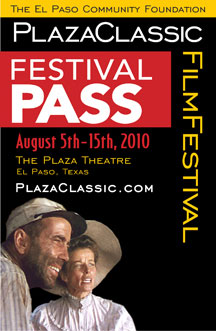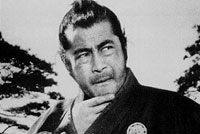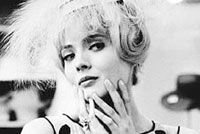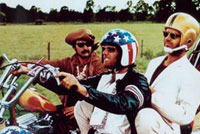NOTES ON A FESTIVAL
————
Film Critic Kevin Bowen is visiting his hometown – El Paso, Texas – and attending the third annual Plaza Classic Film Festival. The festival, running from Aug. 5 to Aug. 15 features 70 classic films. Bowen will write sporadic reports on the classic films that he watches at the festival.
————
Yojimbo (1961, d. Akira Kurosawa)
The value of re-watching old films is to reach new conclusions that reflect growth and experience. Everyone has those films they saw in high school that they were too young to fully appreciate. As a high schooler, I never suspected Akira Kurosawa’s Yojimbo is actually a samurai dark comedy.
And when I say dark, I mean dark. Dark, dark. Like “Michael Haneke called to say ‘Turn that frown upside down'” dark. This is a movie bathing in the worst instinct in human nature.
In the late 19th Century, two rival gangs hold violent sway over an isolated Japanese town, turning it into an undertaker’s delight. The only thing preventing an evil bloodbath is that both sides are too cowardly for an all-out fight to the death. Playing both sides, Toshiro Mifune’s roaming master samurai tries to lure them into a mutually assured massacre, partly for his own twisted amusement. Later, his primary act of nobility gets punished with torture and near-death. That’s dark.
This is a bleak vision of the world made at the peak of the Cold War in 1961. Now think about it … two rival sides … always backing away from the brink of all-out conflict … facing the introduction of a new weapon of mass destruction (a pistol) … a town with a compliant Japanese mayor …. has anyone pointed to this film being a Cold War allegory? This film reminds me as much of Dr. Strangelove as it does Kurosawa’s other epics.
————
Cléo from 5 to 7 (1962, d. Agnes Varda)
There is an astounding visual sequence early in Cléo from 5 to 7 by Agnes Varda, the First Lady of the French New Wave. We see Cléo through a Paris shop window as she samples chapeaux. The camera rolls smoothly along the storefront, capturing the busy street life in the reflection, blending the indoor and outdoor images. We then cut inside to a circling close-up of Cléo trying on hats. The rotating camera captures her images fractured in the store mirrors, creating disorientation out of the mundane.
I don’t know how Varda even conceived of this shot, much less executed it. But the former photographer and her second film give deep consideration to the power of the camera. Take a moment later when two people on a park bench are shot at three different distances. Each has a different feel – close and intimate; medium and removed; long, isolated and part of the surrounding environment.
Or take another photographic idea – the power of observing versus the power of being observed, of being an object. In the latter, others watch us. We attract their attention. We become an influential part of their world. But we become slaves to their distorted image. We deny ourselves to gain that power. Then we watch others. We become unimportant, anonymous to them. We lose the ability to influence but gain the ability to find and fulfill ourselves. This polarity seems at work in Cléo.
As a drama queen pop singer waiting on the results of a cancer test, Cléo at first chooses to be an object. She uses her pending illness to attract attention and sympathy. She maintains this diva posture. Then something changes. She feels horrified when an ass-kissing pair of songwriters presents a new song inspired by her struggle. The song flatters her, worships her, but the dirge does not grasp her real struggle.
At this point, Cléo performs the most meaningful tearing off of a wig in screen history, thereby rejecting her status as a famous object. Naturally coiffed, she descends into the streets into a position of observation and anonymity. She converses with a nude sculpture model in a similar position. She meets a soldier with a real reason to fear death. By the end of the film, she finds new possibilities rooted in her real self.
There are so many small things to talk about in this film of subsections. Notice the integration of the soundtrack with the ambient street noise. At one moment, Cléo passes a child playing a few notes on a piano in the street. Those notes are picked up by the score as she walks. Later, the music abruptly ends amid the flutter of street pigeons. Also note the radical shifts in emotional tone during long takes. Brilliant.
The first time that I saw Cléo, I was impressed by it. The second time I fell in love with it.
————
Easy Rider (1969, d. Dennis Hopper)
What is more amazing about Easy Rider..? That this film was ever made (by a major studio, Columbia, no less)? Or that such a wild country ever existed which could produce such a wild film?
No other significant American film is so precisely moored to its moment in time, an epic freewheeling travelogue through late-sixties America. The only way to make it more sixties would be a special guest appearance by Wavy Gravy and the Hog Farm Commune. (Wavy Gravy’s not in the film, right?)
Easy Rider is a little hamstrung by Dennis Hopper’s limits as a director. While the highway-apocalypse finale is brilliantly put together, there are a few too many loose scenes and underwhelming New Wave mimicry. More disconcerting is Jack Nicholson’s star-turn-at-all-costs role as a tag-along small-town lawyer, a noisy performance in a film of understated authenticity. Do we know for sure that the rambling band of rednecks beat him for hanging out with no-good longhairs? Or are they just sick of him chewing scenery?
Easy Rider has suffered its own Odyssey, from the heaven of cultural myth to the Hell of cultural mockery. Isn’t it time to remove it from the Cinematic Underworld and start seeing it again for what it is — an eager paean to the best virtues that came out of the America of its time? This time-capsule treasure has plenty that is timeless — kindness, cruelty, innocence, sadness, freedom, death.
Yojimbo, Cléo from 5 to 7, Easy Rider
The Plaza Classic Film Festival
Plaza Theatre in El Paso, TX
August 5-15, 2010
for more info, visit Plaza Classic





{ 1 comment… read it below or add one }
Nice comments, Kevin. this is an excellent film festival with an outstanding venue. Thanks for covering it. Anyone interested in classic films should definitely plan to attend.